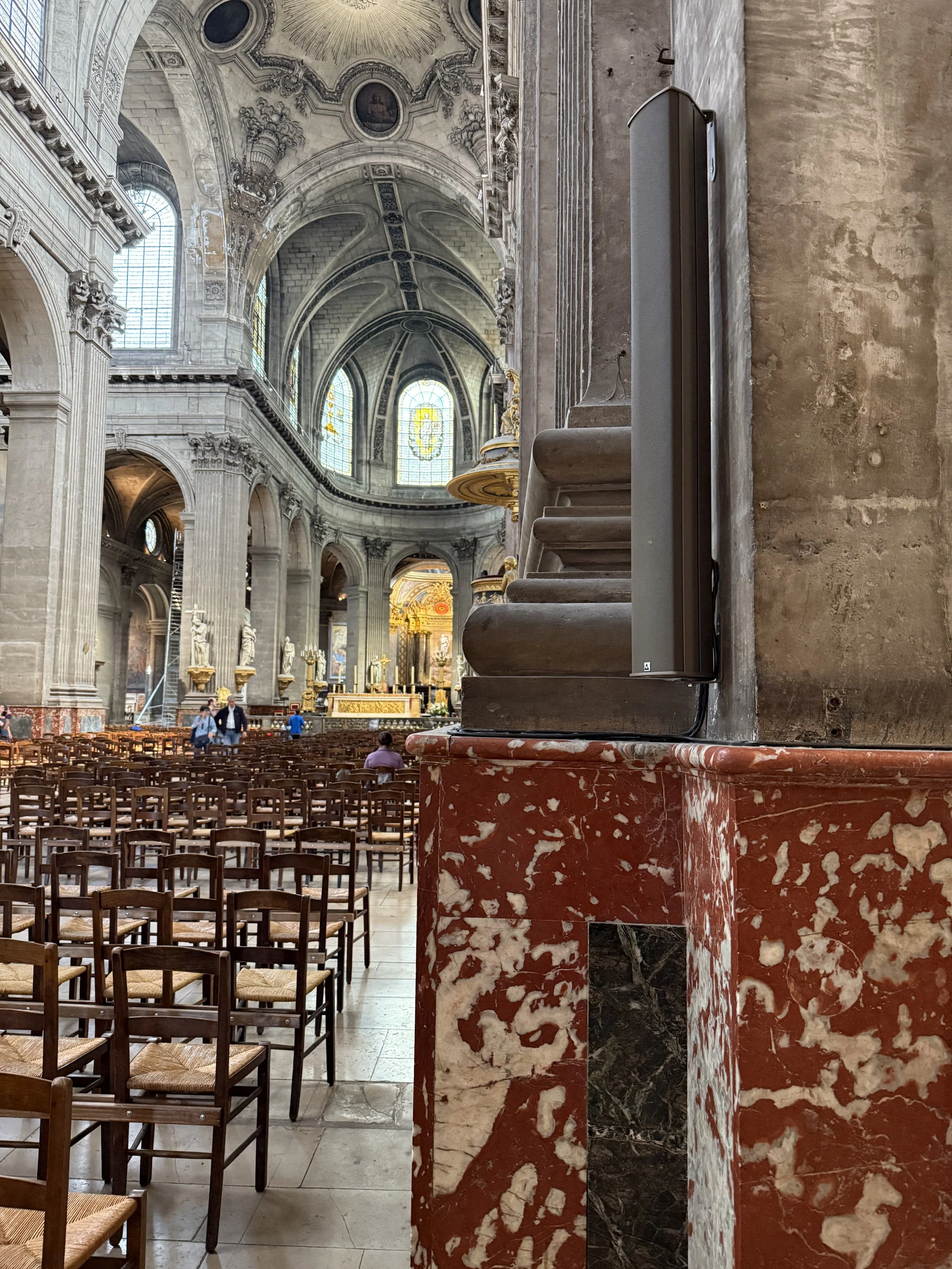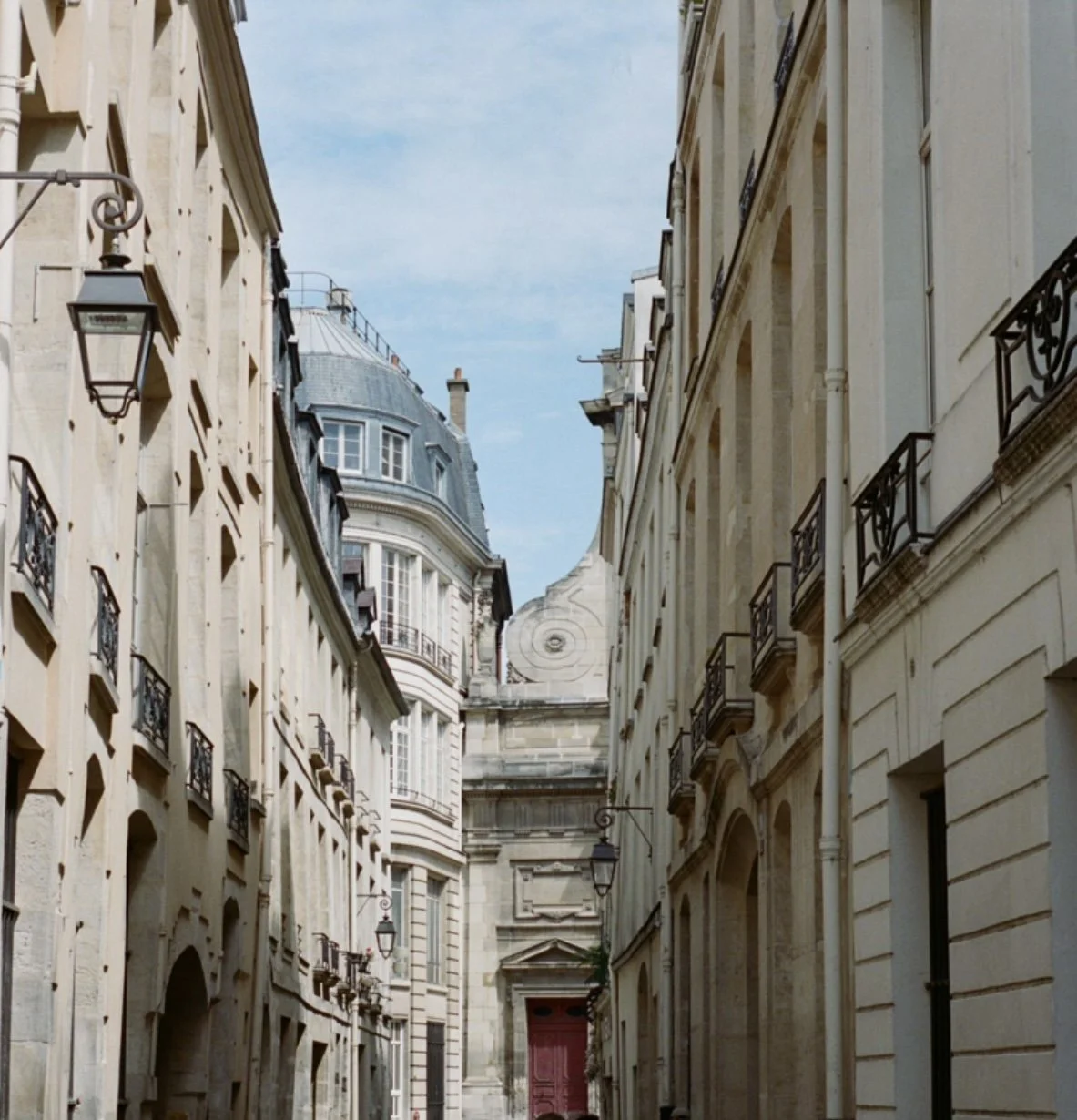If there’s one thing that Les Misérables and my job have taught me, it’s that there is no greater gift than to be loved.
I work as a caregiver at a nursing home: every day, I help residents get out of bed, change, shower, and eat. We spend countless hours coloring together and strolling on the sidewalk, but I often feel like I don’t truly know a resident until I see them with their friends or family. Sometimes, residents are so excited about their children visiting that they tell me about it as soon as they open their eyes. Other times, they’re delightfully surprised! There was once an eighty-year old who kept to herself and wouldn’t move without being thoroughly persuaded. As soon as she saw her daughter, she swiftly stood to hug her. They embraced on the sidewalk outside the nursing home, smiles brighter than the summer sun.
Saint-Sulpice, from Colonel Pontmercy’s point of view
Some of the most impactful moments in Les Misérables occur when characters are deprived of this chance to be with their loved ones. Colonel Pontmercy and Jean Valjean, for example, are both tragically forbidden to be close to their children. In two touching scenes, both of these men are tantalizingly close to reuniting with their families - yet both decide to hold back because of the way they are perceived, one as a disgraced Bonapartist and one as a former convict. Throughout his novel, Hugo illustrates the painful breakdowns of familial relationships as a way to criticize the divisions created by society.
One of the most heart-rending relationships is that of Marius and his father, Colonel Pontmercy. Marius’ bourgeois grandfather, who saw Colonel Pontmercy’s service for Bonaparte as betrayal, threatens to disinherit Marius if the colonel continues to raise him. Forgotten and forsaken, Colonel Pontmercy chooses to stay away from his son, “believing he was doing the right thing and sacrificing no one but himself.” His one consolation is seeing Marius when he goes to mass at Saint-Sulpice. As the colonel gazes at his son, quietly concealed behind a pillar so that Marius’ family will not see, his eyes fill with tears.
One afternoon, we stand behind those very same pillars at Saint-Sulpice. They are unbelievably huge and strangely square. It’s the perfect place to conceal oneself: only one man, a warden of Saint-Sulpice, seems to notice the veteran’s sorrow. The chapel is dazzling in the daytime, grand and open and filled with light, but I imagine that Colonel Pontmercy barely saw the beauty within the chapel’s nave.
I’ve seen just how much the elderly people at my work treasure seeing their families, but it must be very bittersweet - few residents can leave on their own, so most are forced to watch their sons and daughters grow older with each visit, unable to play a part in the rest of their families’ lives. For Colonel Pontmercy, this dual joy and sadness must have been multiplied a hundredfold. From the pillar, the colonel would’ve had a perfect view of his son: the nave is wide and spacious, with chairs arranged neatly in the center. Marius would’ve been so close, yet just out of reach.
On the way to the Rue de l’Homme Armé - photo courtesy of Jake!
Later that week, we trace another touching scene. The sun shines warmly over us as we walk through the city from the Rue de l’Homme-Armé (now called the Rue des Archives) to the Rue des Filles-du-Calvaire. These are Valjean’s last steps, taken during his self-imposed exile. After Cosette marries Marius, Valjean confesses his criminal past to his son-in-law, arousing Marius’ distrust and suspicion. Marius begins to keep his distance; in return, Valjean ventures to the couple’s home less and less. He slowly approaches their residence on the Rue des Filles-due-Calvaire… And then he stops. As he stares at his daughter’s street, “there was in that tragic gaze something that resembled the dazzling brilliance of the impossible and the reflection of an inaccessible paradise.”
He stands still for several minutes, a tear trickling down his cheek.
Then, he goes home, “by the same route, at the same pace, the light fading from his eyes as he moved away.”
When we bookpack Valjean’s path, I can’t help but notice how beautiful the neighborhood is. The sky is a pure, brilliant blue, illuminating the lovely cream-colored walls of the houses below. Every balcony railing is elegantly decorated. The street-lamps are delightfully old-fashioned, with black metal curled in sophisticated swirls. It’s sad to think of Valjean there, stock-still on a street corner. He would’ve been surrounded by so much color and light, all of which paled in comparison to the paradise denied to him. He stood so close to Cosette but couldn’t take the last few steps to her door.
Following in the footsteps of Valjean and Pontmercy makes me realize just how heartbreaking these moments are. How could they have been so close to their children - behind a pillar, or at the street corner - and still have been forced to turn away? Why did such good men have to make such great sacrifices? It’s almost cruel that the scenery was so beautiful; the neighborhood and chapel were so serene, despite both men’s inner strife.
“The supreme happiness of life is the conviction that you are loved, loved for yourself, better still, loved despite yourself.”
Victor Hugo definitely plays into this drama, using descriptions like Valjean’s single tear and Pontmercy’s trembling stance to spark our outrage. We are shocked at how society has separated these men from their families. Because of a difference in political views, Marius’ family casts out the colonel. Because of an inborn contempt for criminals, Valjean is separated from the girl he saved. “The supreme happiness of life,” Hugo writes, “is the conviction that you are loved,” yet both Valjean and Colonel Pontmercy are deprived of this joy simply because of the labels that society has imposed on them.
At work, I don’t know most of the residents’ pasts. I know about some residents’ children and where they used to live, but most people don’t mention their work or what they were known for. That’s how it should be - every single one of these people deserve to be treated with humanity and compassion regardless of who they were before we met them.
Hugo reminds us of the danger of putting politics and policies before people. Tragically, it’s something we still do today - in the face of anger and injustice and hurt, I know it’s easy to forget that those around us still need the same compassion and forgiveness that we do. (When a resident yells at me, I have to fight every urge to change the way I care for them - trust me. I've been there.) But two final, crucial words shape Hugo’s claim: “The supreme happiness of life is the conviction that you are loved… despite yourself.” May we be loved, and may we show love, despite our views and our faults. May our differences never deprive us of our dignity.
“You who suffer because you love, love yet more.”

